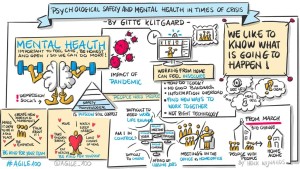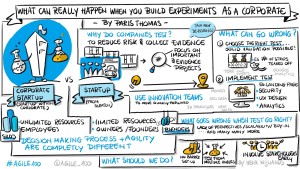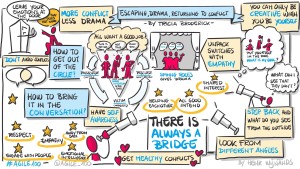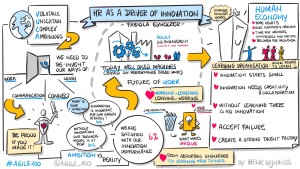Agile100 July 2020 Recap

The third Agile100, as well as the May and June events, had again a very diversified speaker line-up. The presenters Zuzi Sochova and Sohrab Salimi (Trainer Scrum Academy) managed to attract seven speakers on such diverse topics as “agile HR”, “agile classrooms” or “agile anthropology”, who inspired a total of 698 visitors. Video recordings of the lectures are regularly published in the Agile Academy YouTube channel and within the Agile Insights. So have a look at the already published articles of the past events. It’s worth it!
The speakers of the third Agile100
The agile experts and thought leaders of the 3rd agile100 were:
- Gitte Klitgaard (Founder NativeWired): Psychological Safety
- Paris Thomas (Managing Director, Co-Founder Open Box Communication): Building Experiments
- Tricia Broderick (Agile Coach Agile For All, LLC): Escaping Drama
- Fabiola Eyholzer (Board & Executive Advisor JLS): Agile HR
- Chris Li (Founder SparkPlug Agility): Teamwork
- John Miller (Agile Coach & Trainer Agile For All, LLC): Generation Agile
- Marsha Shenk (Founder The BestWork People): Professional & Cultural Agility
„Psychological safety and mental health in times of crisis“
The opening speech and directly a very important lecture was held by Gitte Klitgaard. In her lecture she talked about the psychological effects of the COVID-19 pandemic and the associated safety mechanisms that should be set up both for oneself personally and in professional life.
To be more precise, Gitte’s main theme in “Psychological safety and mental health in times of crisis” was that mental health is something for all people. Not only for those who already feel mental effects. Topics such as social responsibility, open communication and allowing mistakes were addressed as well as possibilities for healthier communication on different levels.
You can see her presentation in full length at: Psychological Safety.
What can really happen when you build experiments as a corporate
The technically most impressive lecture so far was without question given by Paris Thomas. Equipped with 8 monitors and a superlative interactive show, Paris completely forgot the spatial separation of speaker and audience.
His session: “What can really happen when you build experiments as a corporate” also answers questions that you never knew you had. So now the audience not only knows how a dog drinks, but also what the whole thing has to do with innovation and innovation management.
Learn with Paris how you can make experiments that last as a company.
Escaping Drama, Returning to Conflict
Tricia Broderick was certainly the speaker with the earliest alarm clock due to the time difference to Utah. The night ended punctually at 5 a.m. local time before she appeared at 6 a.m. for her lecture: “Escaping Drama, Returning to Conflict”.
Her main concern was to make it clear that conflicts are not negative in a team. After all, they can help to uncover differences of opinion and solve them together. Much worse and potentially toxic for her is the drama behind closed doors and the loss of trust in the team.
In addition to Lencioni’s well-known “5 Dysfunctions of a Team”, she also addressed the effects of personnel changes and other changes in existing teams.
See her presentation about Escaping Drama.
HR as Driver of Innovation
The fourth presentation of the day was given by Fabiola Eyholzer on the topic of agile HR. In her opinion it is important that HR managers and recruiters understand what the buzzwords ‘agile’ and ‘Scrum’ are all about.
After all, you are the ones who make a pre-selection when it comes to finding suitable actors. Here she sees great opportunities, but also immense challenges on the job market for applicants and HR experts.
HR can serve primarily as a business agility accelerator and accelerate the Agile Transformation in a company immensely, if the agile values, principles and processes are already lived during applicant selection and hiring. Agile HR has the ability to make a company more adaptable and responsive, and thus provide a decisive advantage over the competition with AgileHR.
Teamwork – Are we really a team? The question to ask!
Immediately afterwards, Chris Li asked himself the question of whether the right questions are really being asked when putting together a team and working in a team. After all, the recognition of dysfunctions is more difficult than is usually assumed.
In addition, Chris believes that responsibility or the joint assumption of responsibility is actually the decisive factor in teamwork. If this is not taken over by everyone, a team cannot have lasting success.
Everyone in the team also has the right to share their opinions and concerns. Only if everyone is listened to can teamwork be successful. Constructive discussion is therefore for Chris the basis of a healthy team- and therefore also company culture.
Generation Agile: Agile in Education
One topic that has gained immense importance, especially due to the virtual school experience of billions of children, was Agile Education or the lecture on agile forms of learning in schools by John Miller.
Using some vivid examples, John showed how his agile educators in schools ensure that student participation is increased and how schools manage to unite children through agile foundations, processes and principles and show them strengths they did not know they had before.
The real-life stories from various schools not only brought a smile to the audience’s faces, but above all showed how open and native the students of all ages actually are with agile methods and know how to use them.
Practices for Professional and Cultural Agility
The result of 30 years of corporate anthropology brought Marsha Shenk to the table. From her kitchen, she explained where the benefits of agile practices in the corporate world lie. She explained why companies have many advantages when they use the agile framework and how this in turn offers further opportunities in equality.
From her point of view, trade hasn’t changed that much over the past millions of years and even the desired results have remained the same: minimize risk, increase opportunities, improve execution.
What is important today is that executives understand that all the new buzzwords and trends are actually just skills, goals and experiences that have been successful for millions of years. You just have to give it a chance to grow and prosper.
More sessions and recaps from the agile100 conference series
ScrumEDU
=> Willy Wijnands about Scrum in education
agile100 September Event
=> Andrea Provaglio, Boris Radke and our Agile Academy trainer Evelyn Tian were three people who talked at the september event of the agile100
Psychological Safety in virtual environments
=> Joseph Pelrine abot your psychological safety when working remote and in virtual environments



